- Home
- Alex Archer
River of Nightmares (Rogue Angel) Page 2
River of Nightmares (Rogue Angel) Read online
Page 2
“Ladrão!” Annja knew only a smattering of Portuguese, which had similarities to Spanish, “thief” or “scoundrel” being on her list...at least she hoped she was hollering “Thief!” She spotted people milling on the pavement ahead. “Ladrão! Impedi-la!” But they didn’t try to stop the young thief. They just stood and watched as both the girl and Annja raced by.
“Detener al ladrón!” A taxi driver standing outside his car tried to help get the attention of the police—Annja spotted a police car he waved to on the far side of the lot.
“Policía!” someone shouted in Spanish, and then in Portuguese.
She even heard English in the mix, all calling for the police...and all the people in front of the girl jumping out of the way rather than lending a hand to try to stop her. A siren piped in, similar to police cars in the States, but higher pitched. Thunder came louder.
The thief—Annja only got a look at her backside—was probably in her early teens, slight, wearing a T-shirt, jeans and scuffed tennis shoes. The girl was nimble as a monkey, and fast. Annja was in top physical shape, but she wasn’t catching up, just keeping pace. The girl had the satchel over one shoulder, and in the other hand she held a large leather clutch purse...probably also stolen. Clearing the pavement and the sidewalk beyond, the girl darted through traffic and headed into the city. Her legs pumped out a rapid rhythm that Annja matched.
Annja heard a siren crescendo, a police car approaching. The footsteps on the pavement behind her slowed, and then stopped. Whoever had been joining her in the chase gave up. Annja wasn’t about to give up.
The thief looked over her shoulder and Annja caught a glimpse of her face. A kid, probably twelve or thirteen, dark brown hair with glittery pink highlights, freckles splayed across her cheeks. The girl grinned widely and raised a hand, throwing Annja a foul gesture before going faster still.
That only spurred Annja to dig down and lengthen her stride. She had a soft spot for kids, growing up in an orphanage in New Orleans. Annja’d had young friends who occasionally resorted to shoplifting to get special treats or to get a little money so they could buy something. But the thief’s grin and the rude gesture wiped out Annja’s sympathy for her. The thief had braces, and that wasn’t cheap—someone had invested money in the girl.
The buildings that stretched ahead and above were a mix of modern skyscrapers and decades-old colonial charmers, many of them painted tropical shades of peach and pink, flowers hanging from porches and lining the street. All of it was a blur of colors and angles.
The sidewalk they dashed down was crowded, businesspeople heading to work, shops and restaurants opening. The thief exercised no care, rudely shoving folks, pulling some down in Annja’s path to slow her.
Finally someone tried to lend a hand. A businessman at the next corner dropped his briefcase and made a grab for the girl, but she swung a leg out and kicked his feet out from under him. Annja shouted “thanks” as she leaped over him and gained a little ground on the girl who had just gone down an alley that was too narrow for the police car to follow. Annja heard the squad pass her and skid to a stop. Annja slipped through the gap between the buildings, continuing the mad dash after the thief.
A policeman who’d gotten out shouted something about leaving this to the police. But Annja wasn’t sure they could catch the thief. The girl barreled through a side door of the nearest building, and disappeared from sight.
Annja almost lost her balance, her foot catching on something and costing her a few seconds. She followed through the same doorway the girl had entered.
She paused for only a heartbeat while taking everything in. It was a long, busy kitchen, cooks preparing breakfasts, waitresses carrying trays, collecting dishes. The scents were amazing. There was a trail of debris to show the girl’s passage, plates and broken mugs on the floor down one aisle, cartons of eggs spoiled. One of the cooks, a blond-haired man with green eyes, pointed toward a door.
“Get her!” he said in perfect English. “Get the little monster!”
Rather than risk adding to the damage in the kitchen, Annja instead darted back out into the alley and raced to the end of the building, seeing the girl...who was now speeding down another alley that was at a ninety-degree angle to the first. The girl kicked up dirt and gravel and cackled in laughter.
“This isn’t a game!” Annja hollered, continuing to give chase. Two sets of feet coming behind her, the police, she confirmed with a quick glance. Both of the officers were a tad on the pudgy side and she doubted they could keep up.
Annja felt a welcome burn spread up from feet and fill her chest. An adrenaline junkie, she loved running...but for pleasure, to work out, to participate in marathons. Not to chase a kid through an unknown area of a foreign city that she hadn’t been to in more than a few years.
The girl rocketed out of sight again, turning onto a busy street. Annja kept going, and caught a glimpse of her quarry. Annja could more easily hear where the girl was going—cars honking, people shouting in a variety of languages for her to “watch where you’re going!” Annja had to wait for cars to pass, and then sped out during a gap in traffic and hurtled the curb. She smiled at the applause of a group of people who’d just gotten off a bus.
“Catch the thief!” a woman hollered.
“I intend to catch her!” Annja ground out between clenched teeth.
A park came into view, and Annja saw the girl sprinting across it, knocking a man with a cane to the ground. The girl had dropped the clutch purse somewhere and was swinging her free arm, feet chewing up clumps of grass. The park was a mistake for the thief; it let Annja lengthen her stride and close some of the distance. Annja jumped over a hedge and angled toward a fountain. Thunder boomed, and fingers of lightning shot through a darkening sky, matching Annja’s mood.
Annja was angry; not only had the girl stolen from her crew and sent their trip off schedule, but she had no regard for the people she was knocking over. Still, a part of Annja was enjoying this. A chase always had an element of excitement. The thief looked over her shoulder again, this time a snarl on her face. She made another rude gesture at Annja and cut in a different direction, head down.
A police whistle shrieked, and Annja saw that one of the officers was still in the chase, but he was about a hundred yards behind her. She changed directions to follow the girl, who’d just charged across one more street and into the Ver-o-Peso Market. Annja realized from a previous trip that more than a thousand stalls made up the market, traders hawking their wares regardless of the weather. If Annja didn’t catch up now, she’d lose the girl in the jumble of stalls and tents and shoppers.
Fortunately, this early in the day, many of the vendors were still setting up, and the piles of boxes and carts that spread across the aisles made it impossible for the girl to race down any one path with a great amount of speed. The thief tried to push a cart out of the way, but an angry vendor confronted her. The girl pushed him down, but that had cost her precious seconds. Annja was on the thief, sending her flying into a table with jewelry and bright colorful scarves. Vendors cursed and threw up their hands, shoppers gathered to see what the ruckus was. The police whistle cut through all the voices.
Annja tugged the girl to her feet.
The thief struggled, and for a brief instant Annja got a glimpse of her sword in a deep, dark corner of her mind, as if it wanted to be called. But the thief was little more than a child, a nasty tempered one, but a child. And there was a growing crowd to consider.
The girl spoke so quickly Annja couldn’t make it out. Portuguese, something about being a poor, poor girl who had to steal to live, followed by a string of expletives that would make a sailor blush. The tennis shoes were high-end Nikes, and her belt buckle sterling silver and turquoise, the chain around her neck gold. She probably wasn’t poor—the braces had little gems set in them like a rapper might have—she probably just stole for
the rush...because she could get away with it.
Annja passed the girl to the policeman who arrived. He was walking, face red, huffing. He handcuffed the girl, nodded to Annja, then bent and put his hands on his knees to catch his breath. In that instant the girl tried to make a dash for it, but a shopper blocked her way, grabbed her by the shoulders and spun her around back to the officer.
“I believe this belongs to you,” the shopper said. An American tourist, he had a Southern accent. Annja judged by the clothes and chatter of the crowd that had gathered that there were quite a few Americans in the market today.
“Obrigado,” the officer replied. “Thank you.”
Annja picked up Ned’s camera satchel and hoped nothing was broken inside.
“Queixa?” the officer asked. He switched to English. “Will you press charges, miss?” At the edge of the market a police car pulled up, and the cop’s partner got out. Rain started to fall, gently, sounding like the track that had played inside the airport.
“Sim,” Annja said. “Yes, I most certainly will press charges.”
The officer smiled and the crowd cheered.
Annja pulled out her phone and called her crew to tell them she’d recovered Ned’s bag. “The van’s there? Good. Have breakfast without me and then get everything loaded on the boat. I’ll catch up as soon as I can.” Paperwork always took a while.
Chapter 4
Arthur Dillon was the shopper who’d briefly held the thief. He watched the officer prod the girl toward the police car, the woman who caught her followed them.
“Blimey! A bit of excitement today.” Dillon’s British companion drew his trench coat tight and adjusted his hat. “And with a celebrity no less. The lovely lass who caught that thief, I see her on the telly every now and then. Do you follow it?”
Dillon consulted a list he held close in an effort to keep it out of the drizzle. “No, I don’t watch TV much.”
“She’s Annja Creed, a famous archaeologist. Chases mummies and the like. Did a special on vampiric goat suckers or somesuch in Mexico. I caught it the other day. I’ll never go to Mexico because of that.”
“Chupacabra.”
“Eh?”
“The vampiric goat suckers, they’re called chupacabra.”
“Ah, you have watched her! Television doesn’t do her justice.”
“Never saw her before.” Dillon shook his head. “I read a lot. Chupacabra are mythical monsters in Mexico, southwest United States.” He stopped at a vendor selling all kinds of beans and put in an order.
“Wonder what brings her to Brazil? What monsters might abound in this city, don’t you wonder? I should’ve got closer, Artie. Asked you to take a picture of me and Annja Creed.”
Dillon scowled. “I don’t have time for such folly, and you don’t need any notoriety. I have a helicopter at the airport that I have to be on in two hours.” At the next vendor he bought a gallon jar of jaca pulp, dried chuchu, and a couple of bags of oranges.
“And so you need your shopping to be all done with, I know. But did you have to drag me out here in the rain? I could have stayed in my nice, warm flat.”
“It’s the rainy season. You said you had something to tell me. I swear you won’t melt.” Dillon checked off the items he’d already arranged for and scanned the market for the rest. He spotted a tea and coffee vendor he favored and headed that way, trying to shut out the sounds of the sellers and buyers, the traffic shushing by, and the Brit’s constant, annoying chatter. The Brit made a chuffing sound.
Dillon could have placed his orders through a broker in the city, but he needed a brush with civilization every once in a while; the green of the rainforest became overpowering sometimes. He needed reliable Wi-Fi so he could see his emails and catch up on reading the Atlanta Journal-Constitution. He required an occasional stint in a four-star hotel, a long soak in a hot tub, and female companionship that asked no questions and was willing to experiment if the money was right. Above all of that, he’d needed to meet with his British partner, who hadn’t the mettle for venturing into the wild and was crucial to their endeavor.
“So, a rather short stay, then?” The Brit picked up a warty-skinned piece of fruit, made a distasteful face, and replaced it. “Back to the...uh, salt mine, as the American expression goes?”
“Salt.” Dillon laughed. “Yes, so we have just enough time for coffee and our conversation.” He placed one more order, directing all of it to be taken to the airport; then he picked up his cup of coffee and had a sip.
The Brit made a show of drinking from his cup, coughing after having a long swig of the strong brew. “Artie, everything we talked about yesterday morning, it’s handled.”
“Already?” Dillon rubbed at a spot on the back of his hand. “I didn’t think you’d get it locked down for a few days—at the earliest.” He edged away from the growing crowds. “I’m impressed, outdone yourself.”
“I was lucky, is all. Right people in the right places at the right time.”
“And—”
“The shipment we sent a few weeks back netted a tidy sum, all tucked away in the accounts, and got us more lookers for future deals. The next batches, we’d do better with at auction, I think.”
“Will that be difficult to arrange?”
The Brit looked offended. “I’ve set that up. And we’ve a bidder already on the big one, more than one, I think, especially if we start it low...say at two? If we play it right we should get twice that. How fast can we supply the smaller batches? I think I should cut some.”
Dillon held the hot liquid in his mouth, savoring the rich flavor before finally swallowing. “Tell them three weeks. That gives us a good margin. I have the other customers to handle in the meantime.”
“Ah, yes, those fellows in Atlanta and Dallas.”
Dillon gave his partner a foxlike grin. “They are footing most of the bill for all of this.”
“And reaping only a smidgen of the reward.” The Brit raised his cup in a toast. “Thank God for nasty, incurable diseases, what?”
Chapter 5
It was almost noon when Annja reached the docks—dealing with a few of the police department’s Chasing History’s Monsters fans meant she’d stuck around much longer than she expected. It had rained while she was at headquarters, but the sun was out now and sent the temperature up into the high seventies. A haze hung low over the ground, and the riverbank smelled of earth and damp wood. All the sounds of the city were behind her, substituted for fishermen returning from an early morning catch and sightseers of all nationalities...Canadian, Israeli, American, German and French. The cloying odor of city traffic was replaced by the not-as-heavy scent of diesel fuel.
The boat wasn’t what she’d anticipated. She gaped at it, a mix of emotions dancing through her head—surprise, pleasure and overriding that a thick layer of ire.
Ned practically flew toward her, snatched his satchel and set her off balance. He caught her and tried to hug her. “Thank you. Thank you. Thank you, dear Annja. My lenses, all my memory cards, spare camera, waterproof camera. I—”
“—will never again set my bag down unattended in a big airport,” Annja finished, putting him at arm’s length. “Because I will not retrieve it for you a second time. You’ll have to look through it to make sure nothing’s damaged.”
His dark blue eyes sparkled. “No, I certainly won’t leave it unattended again. Seriously, thank you.”
She wanted to be mad at him, but his boyish grin sunk that notion. Ned Lundock peppered her with questions—how did she get the satchel back, did police arrest the thief, where had she been for the past several hours. Ned was new to her crew. He’d been picked up to shoot stills for the website. A photojournalist for a wire service, he’d spent three years in Afghanistan and Iraq embedded with the troops, and had come back to the States a month ago when Chasin
g History’s Monsters made him a lucrative enough offer to lure him away from hard news. The desert had bronzed his skin and lightened his hair; it was such a pale shade of blond that at a distance it looked white. On the flight here, he’d said his time with the soldiers had also bulked him up because every day had been a workout to stay in step. The muscles in his arms strained the seams of his khaki shirt.
“This isn’t the right boat,” she said.
“No, it’s a better one!” This came from Wallace Carper, lead cameraman. Wallace was sixty-two, twice Ned’s age. His gray hair was short, and he was bald on top, as if he had purposely adopted a tonsure; the hairless spot gleamed in the sun. He clunked across the plank to the shore and waved an arm to happily indicate their substitute ride. “Thank the heavens for sick Baptist ministers!”
She raised an eyebrow.
“The so-called dependable boat that we’d booked...it had some serious engine problems, so Doug approved spending a little more and getting this. Not much choice, Miss Creed, almost everything else is for tourists or is already rented. We lucked out with this baby. A group of Baptist ministers from Georgia had her booked for a two-week retreat, but flu swept through them and they canceled this very morning. Lucky, eh?”
“I suppose,” Annja started. “We could use this for a while and—”

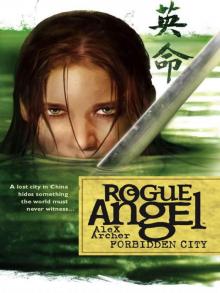 Rogue Angel: Forbidden City
Rogue Angel: Forbidden City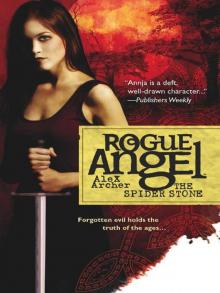 The Spider Stone
The Spider Stone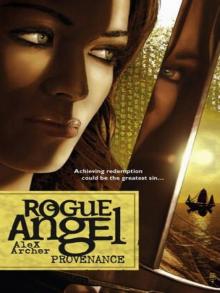 Provenance
Provenance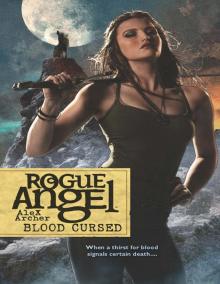 Blood Cursed
Blood Cursed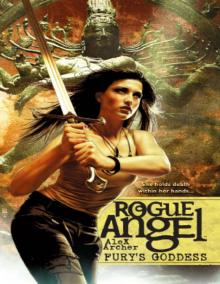 Fury's Goddess
Fury's Goddess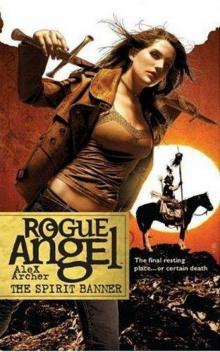 The Spirit Banner
The Spirit Banner Footprints
Footprints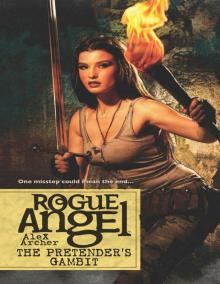 The Pretender's Gambit
The Pretender's Gambit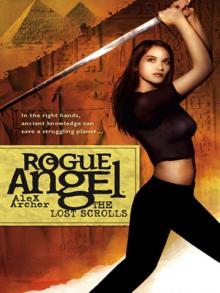 Rogue Angel: The Lost Scrolls
Rogue Angel: The Lost Scrolls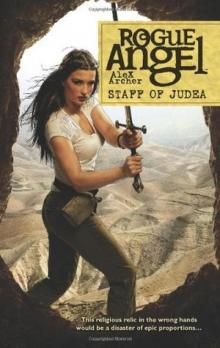 Staff of Judea
Staff of Judea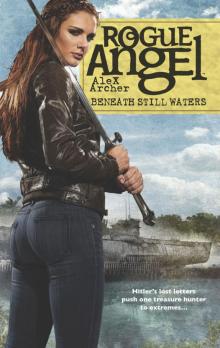 Rogue Angel 55: Beneath Still Waters
Rogue Angel 55: Beneath Still Waters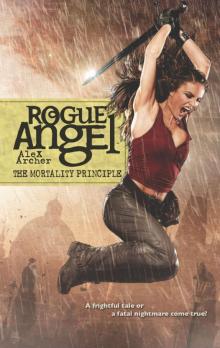 The Mortality Principle
The Mortality Principle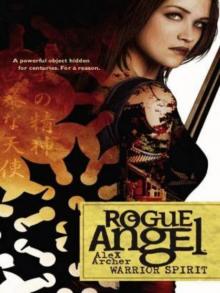 Warrior Spirit
Warrior Spirit Paradox
Paradox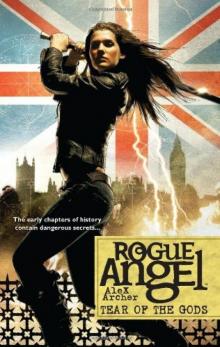 Tear of the Gods
Tear of the Gods Forbidden City
Forbidden City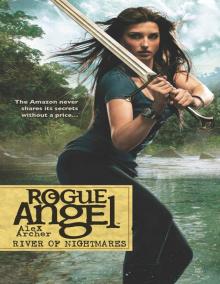 River of Nightmares (Rogue Angel)
River of Nightmares (Rogue Angel)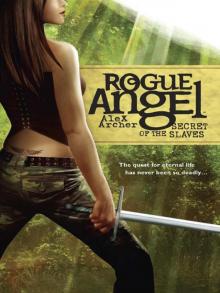 Rogue Angel: The Secret of the Slaves
Rogue Angel: The Secret of the Slaves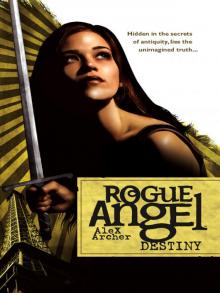 Destiny
Destiny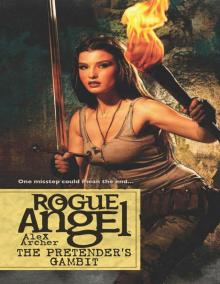 Rogue Angel 51: The Pretender's Gambit
Rogue Angel 51: The Pretender's Gambit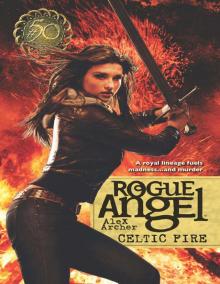 Celtic Fire
Celtic Fire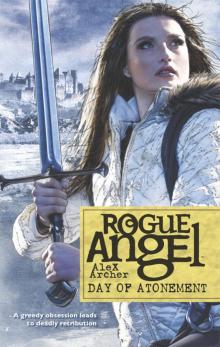 Rogue Angel 54: Day of Atonement
Rogue Angel 54: Day of Atonement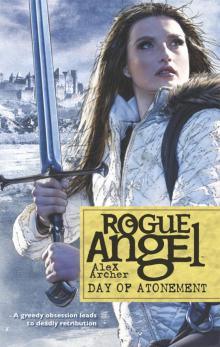 Day of Atonement
Day of Atonement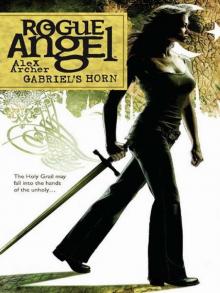 Rogue Angel: Gabriel's Horn
Rogue Angel: Gabriel's Horn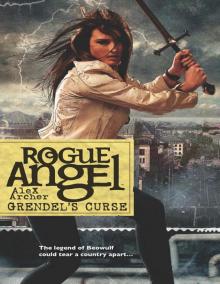 Grendel's Curse
Grendel's Curse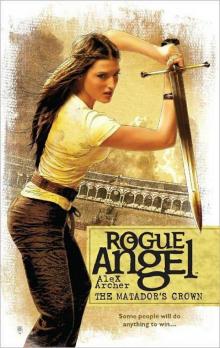 The Matador's Crown
The Matador's Crown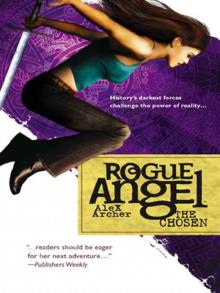 Rogue Angel: The Chosen
Rogue Angel: The Chosen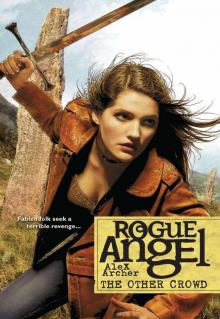 The Other Crowd
The Other Crowd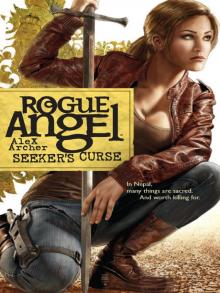 Seeker’s Curse
Seeker’s Curse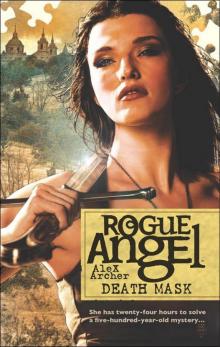 Rogue Angel 52: Death Mask
Rogue Angel 52: Death Mask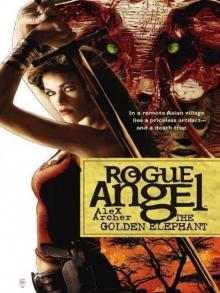 The Golden Elephant
The Golden Elephant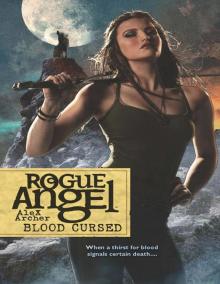 Blood Cursed (Rogue Angel)
Blood Cursed (Rogue Angel)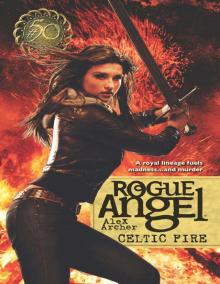 Celtic Fire (Rogue Angel)
Celtic Fire (Rogue Angel)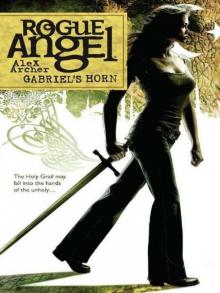 Gabriel's Horn
Gabriel's Horn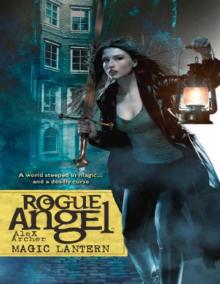 Magic Lantern (Rogue Angel)
Magic Lantern (Rogue Angel)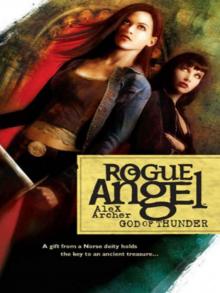 God of Thunder
God of Thunder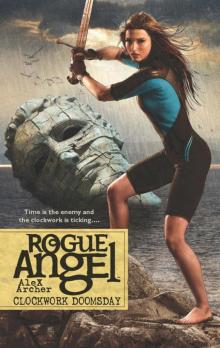 Clockwork Doomsday
Clockwork Doomsday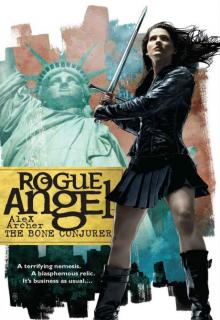 The Bone Conjurer
The Bone Conjurer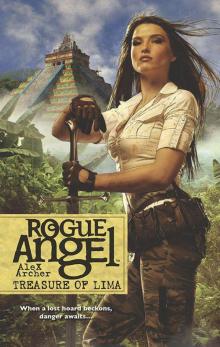 Treasure of Lima
Treasure of Lima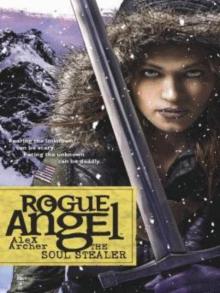 The Soul Stealer
The Soul Stealer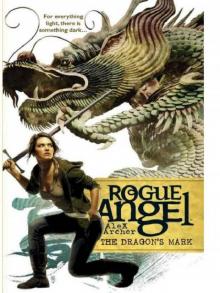 The Dragon’s Mark
The Dragon’s Mark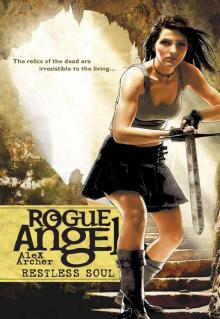 Restless Soul
Restless Soul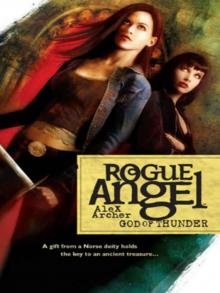 Rogue Angel: God Of Thunder
Rogue Angel: God Of Thunder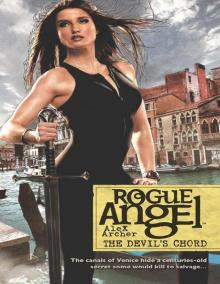 Rogue Angel 49: The Devil's Chord
Rogue Angel 49: The Devil's Chord Death Mask
Death Mask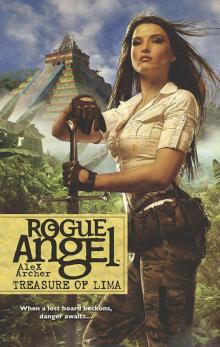 Rogue Angel 46: Treasure of Lima
Rogue Angel 46: Treasure of Lima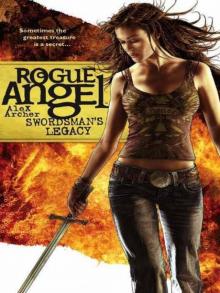 Swordsman's Legacy
Swordsman's Legacy The Oracle's Message
The Oracle's Message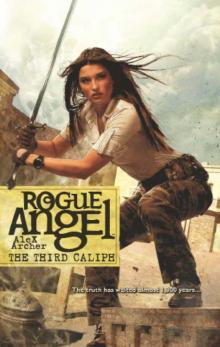 The Third Caliph
The Third Caliph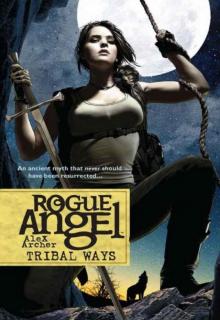 Tribal Ways
Tribal Ways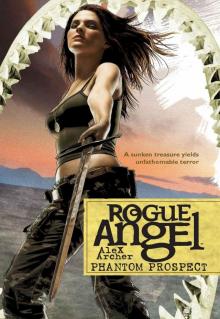 Phantom Prospect
Phantom Prospect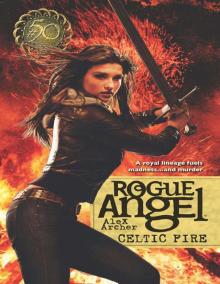 Rogue Angel 50: Celtic Fire
Rogue Angel 50: Celtic Fire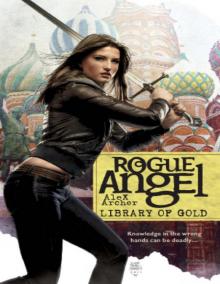 Library of Gold
Library of Gold Rogue Angel 53: Bathed in Blood
Rogue Angel 53: Bathed in Blood Sacred Ground
Sacred Ground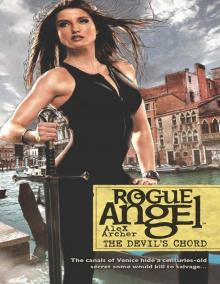 The Devil's Chord
The Devil's Chord Serpent's Kiss
Serpent's Kiss The Vanishing Tribe
The Vanishing Tribe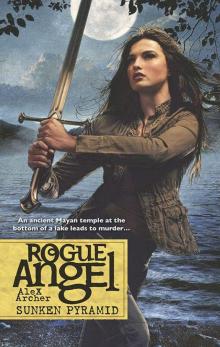 Sunken Pyramid
Sunken Pyramid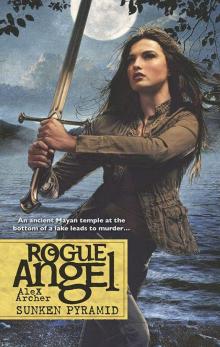 Sunken Pyramid (Rogue Angel)
Sunken Pyramid (Rogue Angel)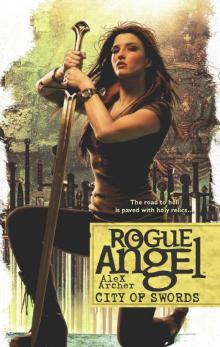 City of Swords
City of Swords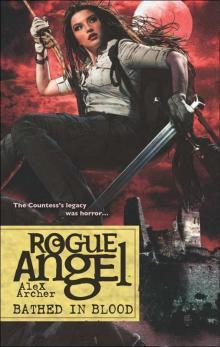 Bathed in Blood
Bathed in Blood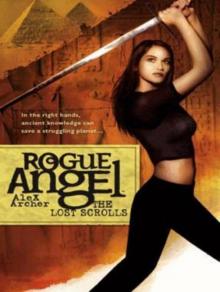 The Lost Scrolls
The Lost Scrolls The Babel Codex
The Babel Codex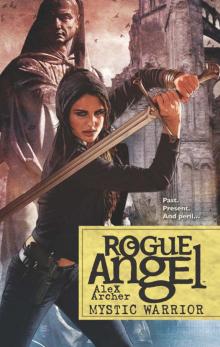 Mystic Warrior
Mystic Warrior Eternal Journey
Eternal Journey Beneath Still Waters
Beneath Still Waters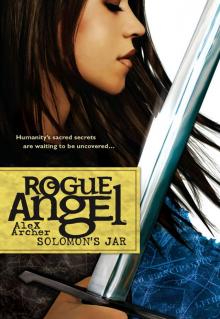 Solomon's Jar
Solomon's Jar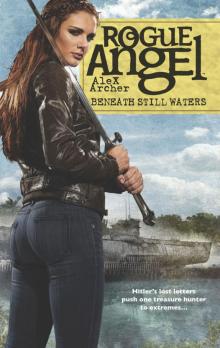 Beneath Still Waters (Rogue Angel Book 55)
Beneath Still Waters (Rogue Angel Book 55) Cradle of Solitude
Cradle of Solitude Secret of the Slaves
Secret of the Slaves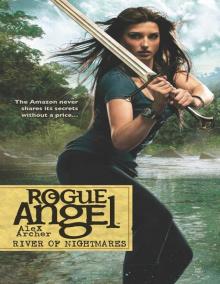 River of Nightmares
River of Nightmares Polar Quest
Polar Quest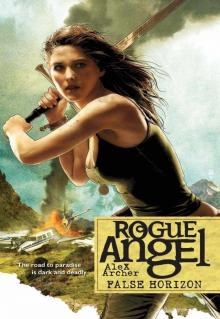 False Horizon
False Horizon